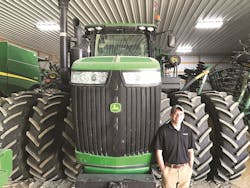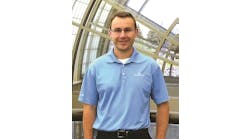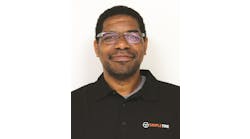James Crouch
National Product Manager, Agriculture | Alliance Tire Group | Age: 31
What was your first job in the industry?
My first job in the industry was as an agriculture business development manager for Michelin North America.
What attracted you to the industry?
I enjoy the agriculture industry in general. Working in the tire segment allows me to be on the ground with farmers and actively trying to improve the productivity of their operation.
What’s the biggest challenge you have faced in your career?
Time management is always an issue. It’s hard for me to say no to an opportunity to conduct a training or participate in a dealer event or trade show. At the end of the day, I have to prioritize my time by opportunity and importance and still make sure some is left for me to unwind.
Who has had the biggest influence on your career?
My first manager really instilled a lot of direction in my career. He taught me that having passion in what you do will create drive and turn you into a better more active contributor. I have tried to make sure that my passion is visible in what I do every chance I get. I believe that shines through to the customers.
What’s your biggest accomplishment in the industry?
I have done quite a bit in growing market share at the OE level. Achieving that is always a challenge because the equipment manufacturers are only concerned with selling machines and it’s up to me as a tire manufacturer to create the demand for our product when they order their new machine. Proving your product to a farmer isn’t an easy thing to do and it takes time. The tires has to perform, create a low total cost of ownership, and the service provided through a strong warranty program and tire setup has to be better than the rest. Seeing a new product finally entered in an OE price book instills a sense of accomplishment that is difficult to find anywhere else.
How do you spend your work day?
My role at Alliance is the national product manager for agriculture. I am responsible for maintaining our agriculture product portfolio. This comes with several different responsibilities some of which are training (both internal and external), tire testing and field survey, pricing, product releases and defining the future product strategy. Our product offering in ag tires is very extensive and we bring new products to market at an incredible rate so most of my day is spent making that process as smooth of a sequence as possible. There are a lot of moving parts in any global organization but one as ambitious as ours requires a lot of time and organization to get products in the market correctly and quickly. The rest of my time is spent more on the strategic side of the ball. Planning for new products and coordinating with our engineering teams and manufacturing teams to ensure we bring new and innovative products to the market when they are needed. I spend well over 75% of my time in the field. I try to get as close to the farmer and retail tire dealer as possible. It’s completely impossible to know what is needed and will be needed in the market if I’m not physically in it. The connection with the farmer is also critical. I have made some very good friends over the last several years by visiting farms and ensuring they’re set up properly or working to resolve an issue. The farming community is inherently fraternal and farmers trust one another. Helping a farmer out by recommending the correct inflation pressure or the correct tire size will get you a long way in some of these markets. Being the tire guy that’s top of mind to the ultimate end user guarantees repeat business and brand stability.
What keeps you up at night?
Anyone that knows me well would tell you that everything does! When it comes to tires, it really revolves around the incredible increase in competitors in this market over the last 5 years or so. It’s easy for a brand that has occupied a market for years to become complacent and brush those new entries off. They may have a weak portfolio or no brand recognition but they are still a risk. All it takes is one innovation that no one else thought of to create demand from the famer and therefore guarantee shelf space at the dealer and inevitably an OE fitment. This is always in the back of my mind. Innovation allows market share and market share is a sustainable and scalable way to keep people on a full schedule in a factory. We do what we do to directly improve the productivity of our farmers and increase yield and indirectly to do our part in feeding a growing population. If we do that well, then we also make sure the thousands of people that wear the Alliance logo in our factories have a stable place to go every morning for work. It’s incredibly important to me.
Early bird or night owl?
A little of both but more the early bird. I like to get up early because I work daily with one team in India (+9:30) and one team in Israel (+7:00). If my day starts too late I could miss a full work day with our colleagues oversees. Close coordination with them is imperative to smooth operations here.
Messy or neat freak?
Oh this one is easy. I’m a clean freak to a fault. I’m pretty sure you could eat off of any surface in my house, office, or truck.
Growing up, what was your dream job?
I’m not really sure I ever had one path nailed down. The only thing I really knew is that I wanted to be in the agriculture industry. That’s about as specific as I knew. I spent eight years of high school and college free time working as a mechanic for a John Deere dealership close to home and I loved it. I loved the equipment and the customers. It was so interesting to me how technologically advanced farming really was. There are a lot of misconceptions out there of what farmers are and who they are when in the simplest form they are small business owners. More importantly they are the stewards of our land. I can’t think of a more important industry to be a part of.
Tell us about your family.
My family is from South Carolina and all still live here except my brother who is in Houston. We farmed in the lower part of the state for years but now have the ground planted in pines. My parents still live on the land.
Describe your first car and what you loved most about it.
My first car was a 1986 Nissan Sentra. It was famously known as the Silver Bullet. At the time the only thing I loved about it was that it could get me from point A to point B.
What advice would you give your high school self?
That’s a tough one. My grades were always good enough and I am satisfied with what I chose for a major in college. I think that’s where most people go. Looking back I guess there are always people you wish you had spent more time with that have since passed on. That would likely by my advice.
If you could have dinner with anyone, living or dead, who would it be?
There are several that immediately come to mind so I’ll just pick one who is currently in the public eye. I would love to meet Jeff Bezos. I can’t think of another person who has gone from the bottom to the top so quickly and so strongly. However, it’s not directly the success of the Amazon machine that I would like to discuss. The focus of the discussion would be innovation. He is an innovator and that makes him a great business person. He has an amazing ability to solve a problem that no one saw as a problem. For example, their acquisition of Whole Foods in hindsight makes perfect sense. The Amazon Prime customer is the same customer that shops at Whole Foods. They fit the techy Amazon customer perfectly. Now I’m watching to see how Bezos will offer innovation through the vehicle of Prime to the grocery channel. There are so many opportunities for innovation in services right now. Physical products are always ripe for innovation also but it seems that services are getting a new focus. How will Amazon make buying groceries easier? I’m incredibly interested to see how they do it. Let’s face it, in the US there are no shortages of places to buy groceries. How can Amazon make their groceries better than everyone else’s. This type of thinking is the same in the tire market. There is a large segment of the Ag tire market that is currently commoditized. Price is the only mechanism for differentiation in several segments of this business. How can someone change that and make their mousetrap better than everyone else’s? I think I would learn more from him in an hour than I could in a year in any Marketing class.
Best way to spend a Saturday night:
I’m a homebody. I travel a ton for work so when I have the chance I like to be at home.
What song do you crank up loud and always sing along to?
Pretty much anything by Led Zeppelin. I don’t think I have ever listened to Immigrant Song at a healthy level.
What habit do you wish you could break?
Checking email in the middle of the night. I think this is something we need to address as a society. I often find myself rolling over at 3 a.m. and checking my mail. Since I work so closely with colleagues oversees there is always something there. Once I see mail my mind starts racing and the night is over.
What’s your secret superpower?
I have the terrible ability to talk about tires to a doorknob for 12 hours at a time.
What game show would you most likely win?
The Price is Right. I watched so much of that show growing up that I’m pretty sure I could land on $1.00 every spin.
If we gave you $1,000 and one hour, how would you spend the money?
I have recently moved into a new home from an apartment so I need furniture badly. My downstairs looks like a dance hall. There isn’t a stitch of furniture down there. I could at least land a few rugs and end tables for $1,000. Let’s not hesitate. Let’s get this set up.
How should the tire industry attract and retain more young talent?
I think like most industries it needs to break away from traditional work styles. Sitting in a cubicle from 8-5 is absolutely not the most productive method of work for many personality types. Tire companies that are stuck with this mentality don’t appeal to most young people who want freedom and independence but still desire a communal relationship with their coworkers. Revolutionary companies like Apple, T-Mobile, and Google have realized this and are reaping the benefits. In order to attract new young talent you can’t offer them a 1950’s work environment. It’s boring.
What do you expect to be doing 20 years from now?
I don’t know the answer to this one and I’ve seen enough to know that even speculation here is dangerous. I want to continue to work at the highest levels of my abilities while always expanding on those abilities. It’s my responsibility to make sure my work environment accommodates for that.
What’s the biggest issue facing the tire industry?
Labor. Labor is very difficult to find right now and very expensive. Building tires is a very manual process and likely will continue to be for some time. Even in sales or another field based position it’s difficult to maintain talent. Let’s face it, the tire industry isn’t sexy. It requires travel and time away from home and it’s super competitive. Companies must find a way to differentiate themselves from the other players in the industry and other industries in general.
If you could spend a day supporting a charity, what would you do?
I’m not sure if it qualifies as a charity but I would love to spend time with the ASPCA. Dogs are easily the best things on the planet. I would love to do anything I could to help them.
If you could start a new career tomorrow, what would it be?
Computer engineering. It’s such a fresh industry. It would be exciting to see where the ability to code could take someone in tomorrow’s world. I believe that in the not so distant future the ability to understand a computer language will be as important as knowing a spoken language.




